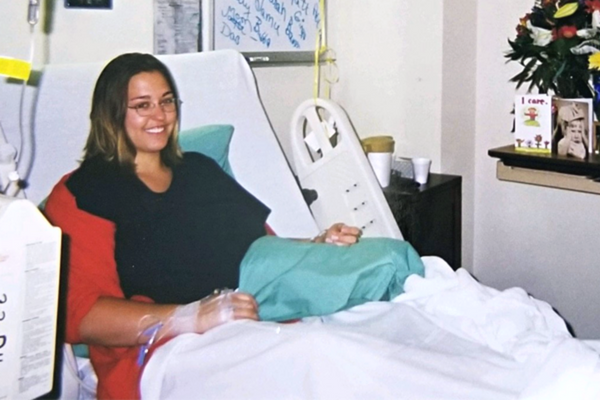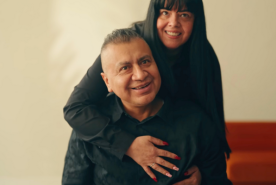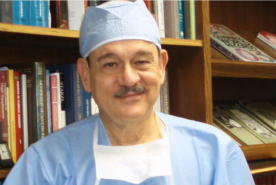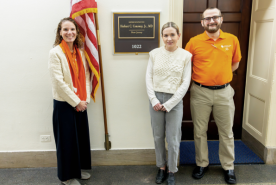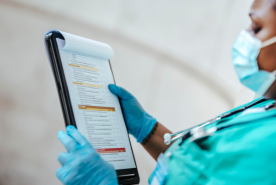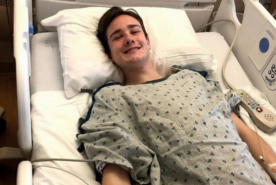March 14, 2023
Jen Anderson made a selfless decision when she was nineteen–she donated a kidney to her aunt. Many other young adults may have found organ donation frightening, but for Jen, it was one of the easiest decisions she has ever made. Since then, she has dedicated her life to protecting living donors and helping more people with end-stage kidney disease receive kidney transplants.
Helping pass the Living Donor Protection Act
[VIDEO::http://www.youtube.com/watch?v=cLyG-3P8jJk::aVideoStyle]
Jen has been involved with National Kidney Foundation (NKF) for more than two decades, a journey that started with her participation in their Golf Classic events and Kidney Walks. In 2018, she moved to Minneapolis and joined the local NKF office board. Recently, she took on a leadership role as Chair of the Minnesota Board of Advisors and championed the Living Donor Protection Act.
"It's been a whirlwind. The work that we've done with the advocacy has been really fun and exciting. We frequently visit the capitol to meet with legislative officials about legislative issues that affect kidney patients, hold fundraising galas, and offer two educational workshops for patients interested in learning about transplants. Our advocates also started pushing the Living Donor Protection Act in front of the Minnesota Senate committee in February 2020. Then COVID hit and completely derailed it all," said Jen. "In 2022, we were able to get back on track and get it passed."
Passing the Living Donor Protection Act protects the citizens of Minnesota who donate a kidney by prohibiting insurance and disability discrimination.
"Insurance is the number one category potential donors want to know about," said Jen during a CBS Minnesota interview. "What happens to my insurance? What if I need to get disability insurance–Will I be able to get it after donating a kidney?"
Do you want to make a difference in the lives of people with kidney disease? Here are all the ways you can take action.
Inspiring others to be living donors
Jen considers her decision to donate one of the best she's ever made.
"Sharing my story, helping encourage other living donors, and putting protections in place for living donors are gifts I’m so happy to give," said Jen. "I was 19 and didn't think about work or long-term impacts but it really gave me a lot of purpose and meaning, especially at such a young age. You can save a life. There's not a lot that can surpass that."
By sharing her story and the benefits of donating a kidney, Jen has inspired at least three people to take steps to become a living kidney donor.
"In 2006, I was talking to one of my coworkers about donating. Her husband's best friend needed a kidney and she did a paired kidney exchange after our conversation," Jen said. "My college roommate who had seen me go through the donation and the testing process, reached out to me for advice because one of her coworkers wanted to donate. Another coworker saw me posting about advocacy and decided to get tested to become an altruistic donor."
Are you searching for a living donor or interested in learning more about living donation? Join the Kidney Learning Center for interactive courses that cover everything from receiving a transplant to becoming a living donor.
Working to lower the financial impact of kidney disease
When Jen isn't sharing her story, she's advocating to lower the cost of end-stage kidney disease. How? She works with the NKF team in Minnesota to share kidney disease education with the public and Minnesota employers to provide more opportunities for living kidney donation.
"It's great for members of Congress to say they are supporting the Living Donor Protection Act as a feel good story, but let's talk about the financial impact of kidney disease. Medicare is spending an enormous amount of money treating chronic kidney disease," Jen said. "Advocates can have a significant financial impact on Medicare’s spending by creating more opportunities for kidney donation, educating the public about kidney disease, and ensuring everyone has access to quality healthcare."
Jen hopes to help lower that spending by enrolling employers in the Living Donor Circle of Excellence, a program that helps remove a financial barrier for those donating a kidney. Circle of Excellence members pay employees at least 80% of their salary for four or more weeks of recovery time should their employee become a living donor. This demonstrates their commitment to saving lives and can save money.
"When you're talking to employers that self-fund, they pay for all the expenses for the first twenty-seven months," Jen said. "They see a significant decrease in the cost if we can avert dialysis and improve somebody's quality of life by getting an early donor and transplant."
Learn more about the Living Donor Circle of Excellence.
Big wins are possible with your voice
Join our network of advocates to influence public policy concerning kidney disease and transplants. Simple activities like emailing, calling, or tweeting your legislators can make all the difference! Sign up to be an advocate, and we'll show you quick, easy ways to make an impact.
